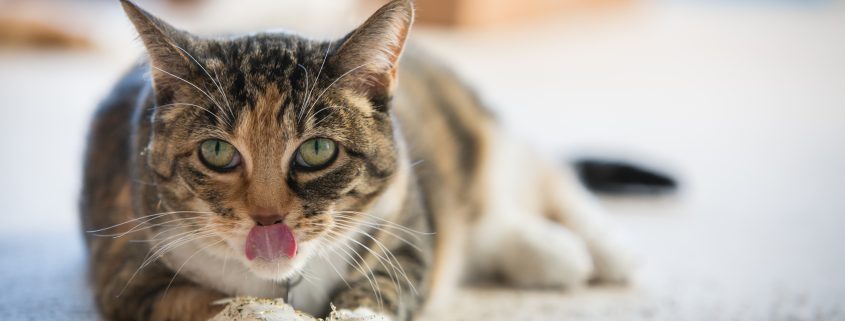If your kitty likes a catnip treat now and then, after just one sniff (or chomp!) you’ve probably noticed your cat starts acting in truly bizarre ways. Entertainment value aside, this herb has proven benefits for felines. But you may still be left wondering why exactly catnip has such a strong effect on our furry friends. From the science behind its magical allure to its heritage and safety concerns, we’ve got your curiosity covered!
What Actually is Catnip?
Catnip plants (Nepeta cataria) are members of the mint family and contain volatile oils, sterols, acids, and tannins. Native to Europe, Asia, and Africa, the plant was brought to North America by settlers; nowadays, the plant is popular in herb gardens and grows widely as a weed.
How Does it Affect Cats?
Cats like catnip for two reasons: smelling it stimulates their senses, and eating it calms them down. Felines are receptive to a volatile oil (an oil that evaporates in the air) found in the stems and leaves of the catnip herb. When they get a whiff or taste of catnip, their behavior starts to change. Many cats react to catnip by rolling around, flipping over, rubbing on everything, and eventually zoning out. This response lasts about 10 minutes, after which the cat becomes temporarily immune to catnip’s effects for roughly 30 minutes. Response to catnip is hereditary; about 70-80% of cats exhibit this behavior in the plant’s presence.
How Catnip Works
This out-of-fur experience is due to the active ingredient in the oil called nepetalactone, which enters the cat’s nasal tissue or mucus membranes depending on whether the catnip is inhaled or ingested. It binds to protein receptors that stimulate sensory neurons. These cells, in turn, provoke a response in neurons in the olfactory bulb, which project to the hypothalamus; the brain’s “master gland” that regulates everything from hunger to emotions.
Health Concerns
While catnip is considered safe for felines, pet owners must be aware of potential complications. In rare cases, consuming large amounts of catnip can lead to gastrointestinal upset in cats, causing symptoms such as diarrhea or vomiting. Additionally, while the effects of catnip are usually short-lived and harmless, overstimulation can occur with excessive exposure, leading to mild behavioral changes or restlessness in some cats. Pet owners are advised to use catnip sparingly and to monitor their pet’s reaction, ensuring a safe and enjoyable experience for their furry friend.
Your Pets are our Priority!
At the National Animal Supplement Council, our top priority is to promote the health and well-being of your pets. That’s why we created the NASC Audit Program and the Quality Seal: to help you identify animal health and nutritional supplements from responsible suppliers committed to producing the highest quality, most consistent products on the market. Visit our website to learn more and see a list of companies and brands awarded the NASC Quality Seal.


